Authentic Italian Pizza: Secrets From Naples’ Best Chefs
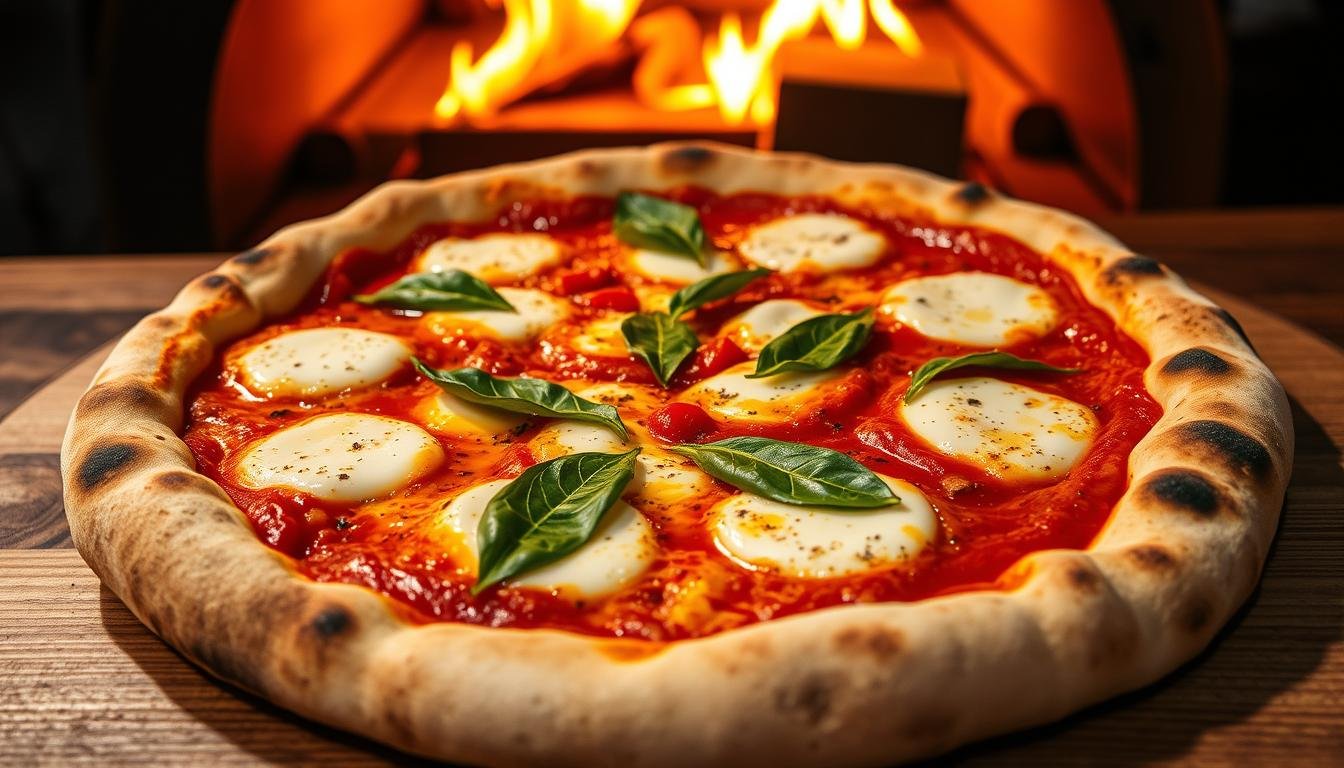
Ever had a bite of real Italian pizza and just sighed happily? For me, a trip to Naples changed how I see pizza. Imagine strolling through streets lined with cobblestones. The air smells of fresh basil and baked dough. It leads to wonderful places where Naples’ cooks share their secrets.
Neapolitan pizza is more than food; it’s an art. It blends hand-stretched dough, bright tomato sauce, and melted mozzarella. This pizza isn’t just a meal. It’s a piece of history and shows the love Neapolitan chefs have for their work. They respect tradition but also love new ideas. Let’s discover the magic of Italian pizza together with Naples’ best chefs. Your taste buds will be happy!
Key Takeaways:
- Discover the rich history and cultural roots of Italian pizza.
- Learn the authentic techniques used by Neapolitan pizza masters.
- Understand the importance of traditional ingredients in creating the perfect pizza.
- Explore how top chefs in Naples balance tradition with innovation.
- Get inspired to try making authentic Italian pizza at home.
The Origins of Italian Pizza
Italian pizza is known all over and started in Naples. It became a part of Italian food culture long ago.
History of Pizza in Naples
Pizza’s tale begins in Naples’ streets. It was first a poor man’s meal, made of flatbread, tomatoes, garlic, and cheese. Vendors sold it as a cheap, fast food. Soon, it won everyone’s hearts, growing from simple street food to a gourmet delight.
Traditional Ingredients Used
The simplicity of pizza is its strength. It uses San Marzano tomatoes, making it tasty. Mozzarella di Bufala adds freshness. Tipo 00 flour makes the dough light. These ingredients give pizza a special flavor.
Evolution of Pizza Styles
Pizza has changed a lot since it started. It began with a few types but has many now. Neapolitan pizza stays classic with thin crusts. But pizza has changed to fit local tastes everywhere. From crispy Roman pizza to thick Sicilian pizza, each style has its story.
Key Ingredients for Authentic Italian Pizza
Achieving an authentic Italian pizza is all about sourcing the highest quality ingredients! The right flour, tomatoes, and cheese make your homemade pizza amazing. It’s a transformation from good to out-of-this-world delicious!
The Importance of Flour
The foundation is the dough. When discussing italian pizza flour tipo 00 versus alternatives, tipo 00 flour is a game-changer. This flour creates a soft and chewy crust, like in Naples.
All-purpose flour can work, but tipo 00 is best. It absorbs water well and makes dough easy to stretch. This gives you the perfect pizza base.
Types of Tomatoes for Sauce
The italian pizza sauce san marzano tomatoes are famous for sweetness and low acidity. They grow in Italy’s Sarno River Valley’s volcanic soil. This gives your sauce a robust flavor and pleasing texture.
Chefs in Naples prefer these tomatoes for a reason. They add a depth to the sauce that’s unmatched. Though other tomatoes work, San Marzano tomatoes are the best choice.
Quality of Cheese: Mozzarella vs. Others
Cheese is key on your pizza. An italian pizza mozzarella types comparison guide shows the unique qualities of each cheese. For instance, buffalo mozzarella is creamy and mild. It melts well and complements the sauce and crust perfectly.
Alternatively, Fior di Latte is firmer. While provolone or pecorino romano are alternatives, mozzarella is the top cheese for real Italian pizza.
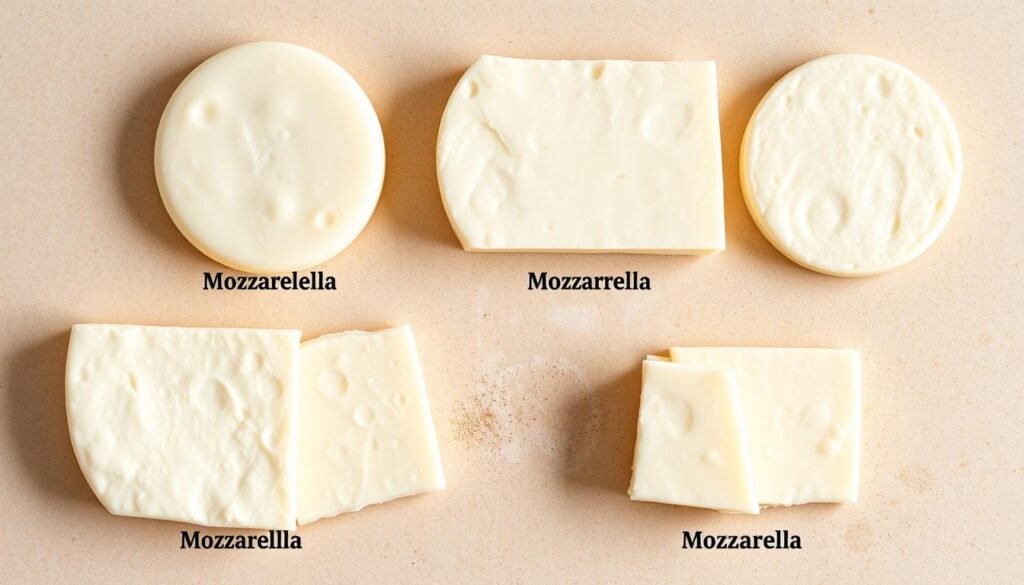
| Ingredient | Best Option | Alternatives |
|---|---|---|
| Flour | Tipo 00 | All-purpose, Bread Flour |
| Tomatoes | San Marzano | Roma, Cherry Tomatoes |
| Cheese | Buffalo Mozzarella | Fior di Latte, Provolone |
The Art of Dough Making
Making the perfect Neapolitan pizza dough takes dedication and knowledge. It’s not just about mixing flour and water. It involves understanding hydration levels and the timing of fermentation.
Neapolitan Dough Techniques
In Naples, people mix pizza dough by hand. This keeps its texture unique. They mix water, flour, yeast, and salt carefully. It’s important to get the hydration right. The correct amount of water makes the crust light and airy.
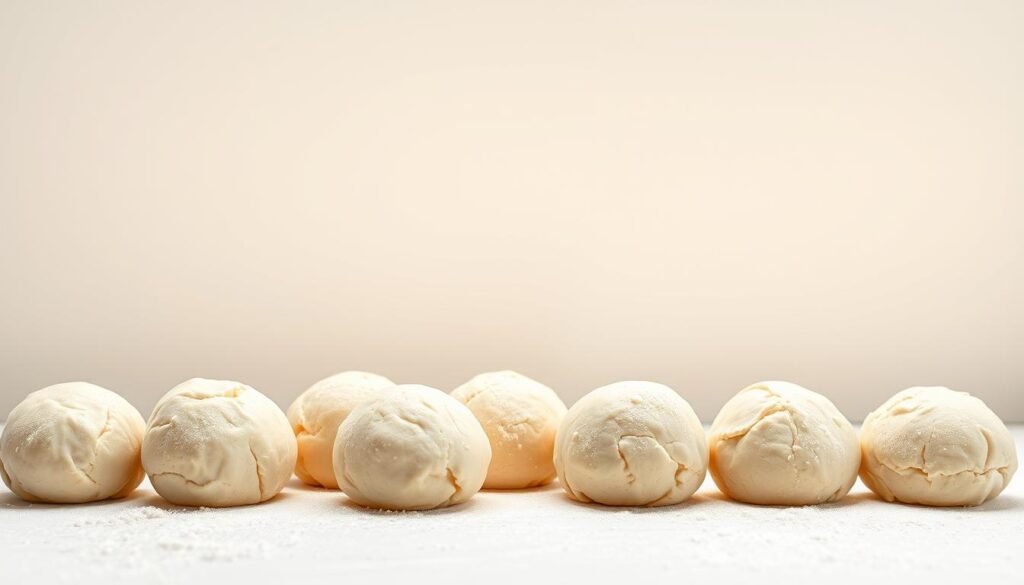
Fermentation and Rising Times
The science of fermentation timing is fascinating. For a tasty crust, the dough must ferment slowly, over 24 hours. This long rise develops the flavors and makes the dough light. Every bite becomes a delight!
Common Mistakes to Avoid
Even experienced cooks can mess up Neapolitan pizza. Common mistakes include over-kneading and short fermentation times. These errors make the dough dense or bland. Following the science of fermentation timing helps avoid these issues. It ensures your pizza is always delicious!
Famous Pizza Styles from Naples
Naples is more than the birthplace of pizza. It holds a variety of mouthwatering styles. Each style shows the rich history and art of Italian pizza. We’ll explore from the classic Margherita to the unique Pizza al Taglio.

Margherita: A Classic Favorite
The Margherita stands out as the most iconic. It uses tomatoes, mozzarella, and basil. These simple toppings boost the dough’s flavor. This shows why Italian pizza is loved worldwide.
Marinara: Simplicity at Its Best
The Marinara is also well-known in Italy. It mixes tomato sauce with garlic, oregano, and olive oil. With no cheese, it lets the other flavors shine. It offers a unique and tasty experience.
Pizza al Taglio: A Different Approach
Pizza al Taglio breaks the mold with its shape. It’s rectangular and has a crunchy crust. Cut into squares, it’s easy to share. This style shows the creativity of Italian pizza. It’s a fine example of Naples’ pizza variety.
| Pizza Style | Key Ingredients | Characteristics |
|---|---|---|
| Margherita | Tomatoes, Mozzarella, Basil | Classic, Simple, Fresh |
| Marinara | Tomato Sauce, Garlic, Oregano, Olive Oil | Minimalist, No Cheese, Bold Flavors |
| Pizza al Taglio | Varied Toppings | Rectangular Shape, Crunchy Crust, Convenient Slices |
Cooking Techniques for Perfect Pizza
Want to make Italian pizza like a pro? You’re in the right spot. Years of perfecting my craft taught me some secrets. Let’s dive into making that ideal crust and bubbly cheese happen.
The Role of a Wood-Fired Oven
Nothing beats a wood-fired oven for Italian pizza. It heats up to 900°F, cooking the pizza quickly. This makes the crust both airy and crisp. If possible, use one to boost flavor and authenticity.
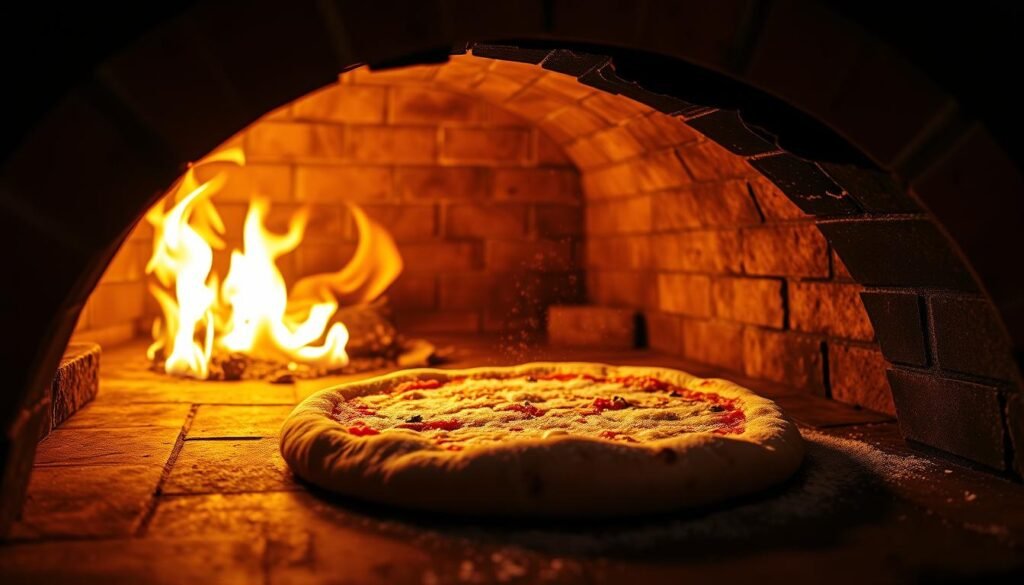
Temperature and Cooking Time
Getting the temperature right is key. You need 700°F to 900°F, whether in a wood-fired or kitchen oven. This makes cooking fast, from 60-90 seconds. Thus, the dough gets fluffy with tender inside.
Using a Pizza Stone at Home
No wood-fired oven? Use a pizza stone. It spreads heat well, making for a great cook. Heat it at your oven’s max, about 500°F. This mimics a wood-fired oven, giving you a crispy crust. Now, grab the tools and let’s start baking that pizza!
Pizza Toppings: Tradition vs. Innovation
Exploring traditional and inventive Italian pizza toppings is thrilling! Let’s see how Naples, where pizza was born, mixes old traditions with new taste ideas.
Traditional Toppings in Naples
Traditional toppings in Naples keep it simple. The Margherita and Marinara pizzas use fresh, top-notch ingredients. You get tangy San Marzano tomatoes, creamy buffalo mozzarella, and fragrant basil. These toppings make the pizza unforgettable, letting the dough and sauce stand out.
Unique and Contemporary Combos
Tradition is key, but so is innovation. New pizzerias try out gourmet toppings for a fresh take on the classic. Think truffle oil with wild mushrooms or figs with prosciutto. These new ideas mix unexpected flavors but still respect the original pizza dough.
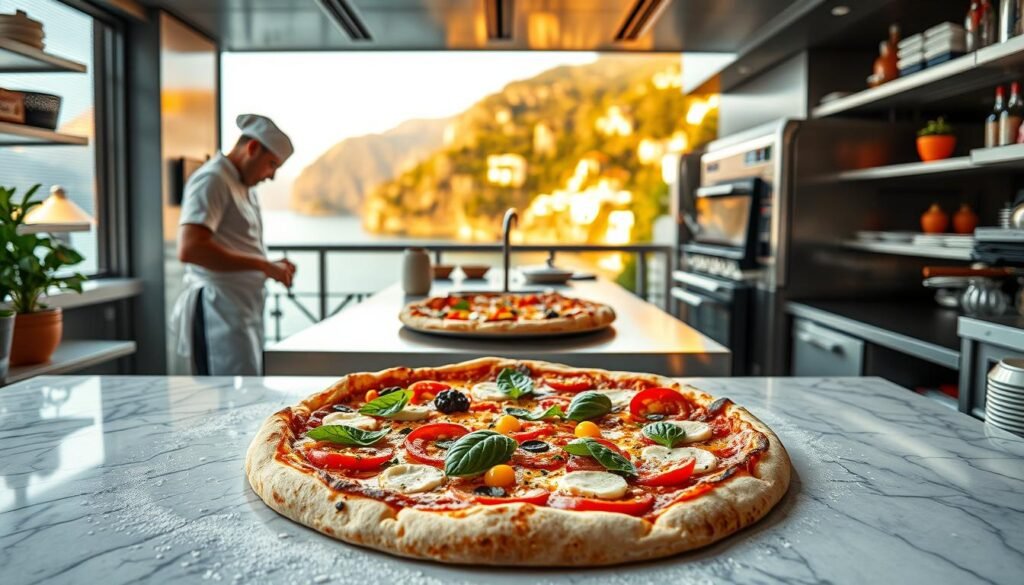
Seasonal Ingredients and Their Impact
Using seasonal ingredients is a big deal in Italian cooking. This includes pizza too. Fresh, local produce ups the flavor and supports sustainability. Picture a summer pizza with cherry tomatoes and arugula or a winter one with squash. These choices keep your pizza fresh, tasty, and in tune with the seasons.
In the end, whether you like traditional or modern pizzas, the secret is in the flavor balance. This respects the true Italian pizza spirit. Happy cooking!
Pairing Italian Pizza with Beverages
Choosing the right drink with your Italian pizza can make your meal amazing! Whether it’s a traditional side dish or you’re exploring Italian versus American pizza, the perfect beverage will lift your pizza game.
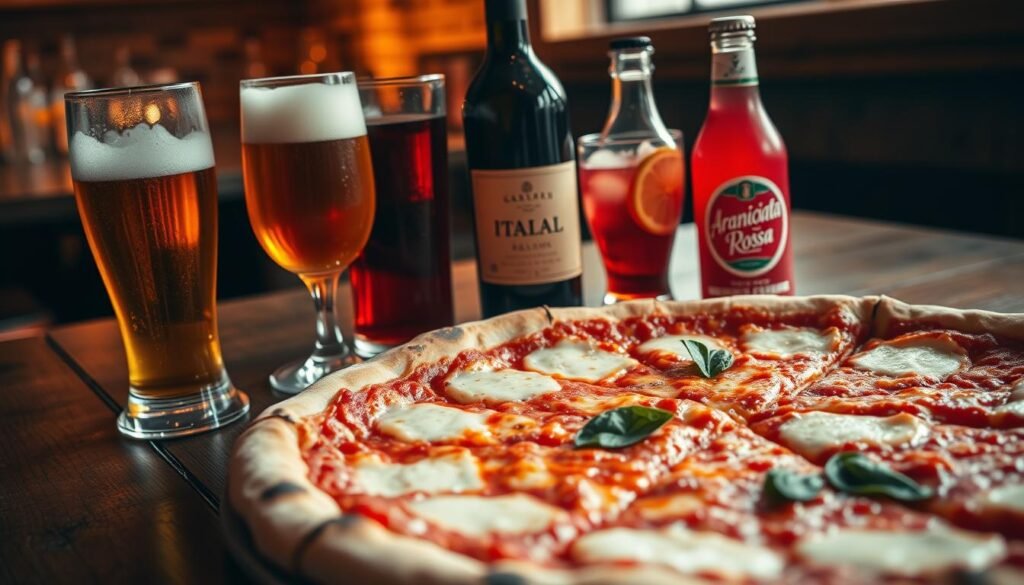
Ideal Wine Pairings
For an authentic Italian pizza meal, certain wines do wonders. A light red wine, like Chianti, matches the tomato sauce’s acidity. A bold white wine, like Vermentino, is great with cheesy, rich toppings. Ever had Lambrusco with pizza? It’s a bubbly red that adds a fun twist!
Craft Beer and Pizza Combos
Different beers go well with Italian and American pizzas. Craft beer, with its wide range of tastes, is perfect for any pizza. An IPA cuts through meaty toppings. A Belgian Witbier highlights the herbs and spices. And a light Pilsner is great with simpler pizzas like Margherita or Marinara.
Non-Alcoholic Options
If you’re skipping alcohol, there are still great choices. Sparkling water is a simple option that cleanses your taste. Artisan sodas bring exciting flavors like blood orange or ginger. Or try a cold iced tea to balance the pizza’s taste. These are great with all kinds of pizza!
| Beverage | Best Paired With | Why It Works |
|---|---|---|
| Chianti | Margherita Pizza | Its light acidity cuts through the tomato sauce. |
| Vermentino | Cheese Pizza | Highlights the richness of the cheese. |
| IPA | Meat Lovers Pizza | Balances fatty meats with bitterness. |
| Belgian Witbier | Herb Pizza | Complements herbs and spices. |
| Sparkling Water | Any Pizza | Clears the palate effectively. |
| Artisan Sodas | Veggie Pizza | Unique flavors add an exciting twist. |
How to Replicate Authentic Italian Pizza at Home
Making authentic Italian pizza at home is really fun and rewarding! All you need are the right tools. You can become a pizza-making pro. Imagine the aroma of fresh pizza in your kitchen. Let’s look at what you need to make that perfect pie.
Essential Equipment for Home Chefs
To start, the correct tools are a must. Quality tools make a big difference. You’ll need a pizza stone or steel for the right cooking surface. Also, a pizza peel is key for moving your pizza. If you love making dough, consider getting a stand mixer.
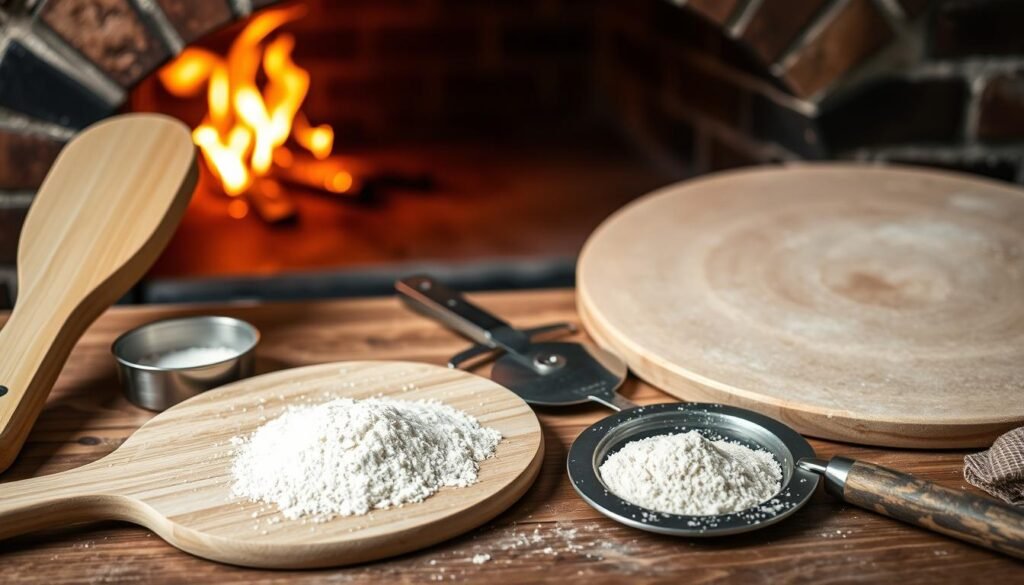
Step-by-Step Recipe Guide
Now, let’s talk dough. The secret is in the fermentation timing. Mix, knead, and let it rise. This develops the flavor. Then spread your sauce, add toppings, and bake at high heat. This gets you a crispy crust.
Troubleshooting Common Issues
Even top chefs face problems, but don’t stress! If your dough isn’t rising, it may need more time or a warmer place. Facing uneven cooking? Look into comparing cooking surfaces to find the best fit for your oven. With these tips, you’ll master pizza making soon!
The Importance of Presentation in Italian Pizza
I’ve always believed presentation can boost the dining experience. It’s about more than taste. It’s creating a feast for the eyes too!
Plating Techniques for Pizza
For Italian pizza presentation techniques, plating matters a lot. Choose a wooden or ceramic plate. Place the pizza so it looks handcrafted. Add fresh basil around it for color.
Visual Appeal of Ingredients
Top ingredients make the pizza look and taste better. Imagine bright red tomatoes and green basil on it. These colors should make the pizza appealing. Have you seen olive oil shine in the light?
Garnishing Tips for Enhancement
Garnishing is key! Use Italian pizza garnishes traditional authentic. Try fresh herbs, grated Parmesan, or balsamic glaze. This adds flavor, texture, and makes the pizza hard to resist.
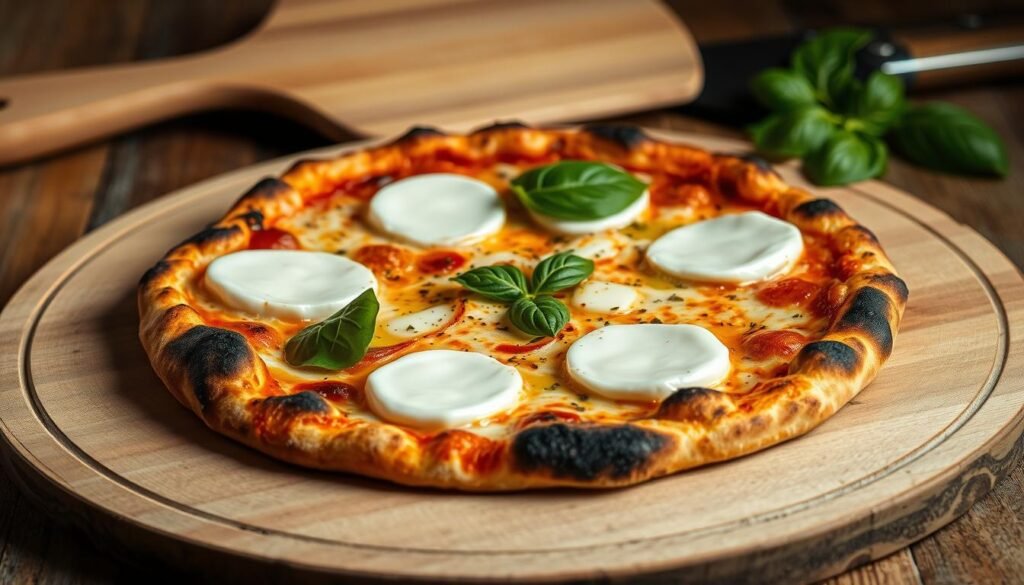
Resources for Pizza Enthusiasts
Do you love authentic Italian pizza so much you can’t get enough? There are tons of resources to help you learn more! You can find great books on making traditional pizzas, visit the best pizzerias for inspiration, and take online courses from top chefs. Let’s see how you can become better at making pizza!
Recommended Books on Italian Pizza
Want to learn how to make Italian pizza like a pro? There are several great books you should read. “The Art of Pizza Making: Trade Secrets and Recipes” by Dominick DeAngelis and “Mastering Pizza” by Marc Vetri are two of them. They’re filled with tips and recipes from Italy’s best pizza makers to help you improve.
Notable Pizzerias to Visit
Tasting pizza at famous italian pizza places is an amazing experience. Visit places like Pizzeria Brandi in Naples, where Margherita pizza started. Or, try L’Antica Pizzeria da Michele for its simple but incredible pizza. These spots don’t just offer great food but also teach you about pizza’s history and traditions.
Online Courses and Tutorials
If you can’t travel, don’t worry! You can still learn about Italian pizza online. Websites like MasterClass have chefs like Nancy Silverton teaching pizza-making. There are many online courses that cover everything from making dough to choosing toppings. So, you can easily learn from experts without leaving your house.